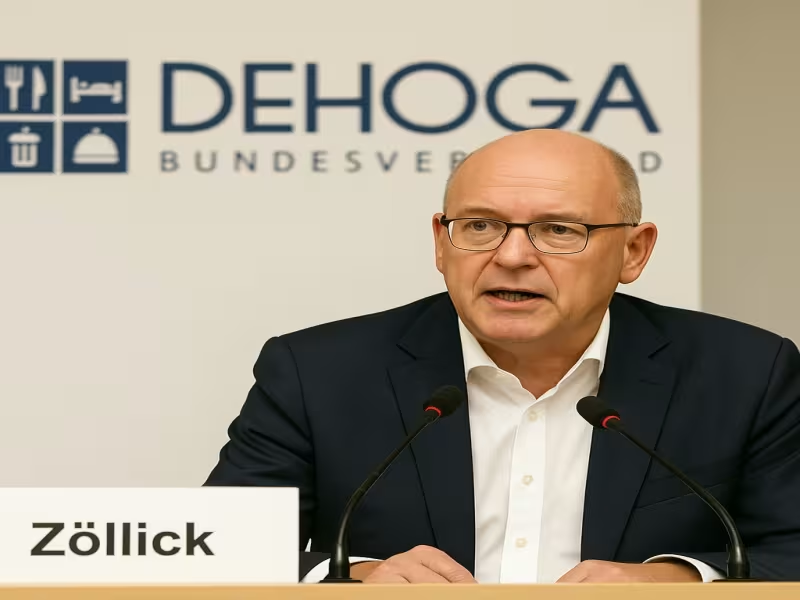
SHERIDAN, WYOMING – September 15, 2025 – Germany’s hotel and restaurant industry is facing its sixth consecutive year of financial strain, as operators report steep revenue declines and rising operating costs. The German Hotel and Restaurant Association (DEHOGA) is urging the federal government to implement decisive tax reforms, including the permanent reduction of value-added tax (VAT) on meals to 7 percent, to stabilize the sector and protect jobs.
Mounting Pressures Highlight Urgent Need for Policy Action
According to preliminary data from the Federal Statistical Office, hospitality revenues in the first half of 2025 were down 15.1 percent in real terms compared with 2019, the last pre-pandemic benchmark year. At the same time, nominal revenues rose by 10.9 percent due to inflation. The mismatch underscores the pressure operators face as customers become more price-sensitive while expenses climb at unprecedented levels.
“Die Kosten explodieren, die Gäste sind preissensibler, die Umsätze sinken. Die aktuellen Belastungen bringen viele Betriebe an ihre Grenzen,” said DEHOGA President Guido Zöllick in Berlin. “Jetzt ist entschlossenes politisches Handeln nötig – für starke Betriebe, sichere Jobs und echte Perspektiven.”
VAT Reduction Seen as Catalyst for Recovery
DEHOGA’s central demand is the immediate implementation of a uniform 7 percent VAT on meals, effective no later than January 1, 2026. The association argues that aligning restaurant taxation with that of take-away services and retail-prepared meals will create fairer competition and secure much-needed planning stability.
Survey data indicates that:
- 76.2% of businesses expect improved financial stability under a 7% VAT.
- Nearly 60% would safeguard or expand employment.
- More than half would increase investments in modernization and digitalization.
These findings suggest that policy adjustments could unlock significant reinvestment into the sector’s resilience and growth.
Economic Ripple Effects Across Regions
The hospitality sector’s reach extends beyond direct services. Nearly 78 percent of establishments source goods or services from regional craftsmen and beverage producers, while around three-quarters rely on local butchers and bakers. This makes restaurants and hotels a crucial link in local supply chains and a steady client base for small and mid-sized enterprises. A uniform VAT reduction would not only strengthen hospitality businesses but also fortify entire regional economies.
Consumer Shifts Intensify Competitive Pressures
German consumers are increasingly trading down, with many opting for cheaper dishes, skipping extras, or substituting dine-in experiences with lower-taxed retail options. As a result, traditional establishments face shrinking margins and lost market share to supermarkets and delivery platforms. The gap highlights a regulatory imbalance that industry leaders argue must be addressed to restore competitive fairness.
Investment Capacity Severely Constrained
DEHOGA’s latest survey, covering nearly 4,000 businesses, revealed that 72.1 percent of operators have been unable to make essential investments in recent years. Only 27.9 percent reported being able to modernize to the extent needed to stay competitive. With labor costs up by 34.4 percent since 2022 and food and beverage prices rising by up to 33.7 percent, operators report that reinvestment is no longer feasible under the current tax framework.
Strategic Reform Imperative for Germany’s Economy
The hospitality industry employs 2.2 million people, trains more than 50,700 apprentices, and generated €115 billion in net revenue in 2023. As a sector dominated by small and family-run businesses, its vitality is integral to Germany’s economic fabric, labor market, and cultural appeal.
“Unsere Restaurants, Wirtshäuser und Cafés, Kneipen und Bars, Caterer sowie Hotels und Pensionen sind Orte der Begegnung und des Austausches, der Weltoffenheit und Gastfreundschaft – Visitenkarte Deutschlands. Damit sie das auch in Zukunft bleiben können, braucht es jetzt eine verlässliche Politik,” emphasized Zöllick.
Industry leaders warn that without swift reforms, Germany risks weakening one of its most labor-intensive and socially impactful sectors at a time when regional economies depend on its multiplier effects.
Looking Ahead: Policy Decisions Will Shape 2026 and Beyond
With the minimum wage set to increase by 8.4 percent in January 2026 and further cost pressures looming, industry stakeholders are pressing for reforms that go beyond VAT. DEHOGA has called for a broader “reform offensive,” including bureaucracy reduction, labor flexibility, and investment incentives, to ensure that the hospitality sector can continue as both a job engine and a cultural cornerstone.
Learn more at www.dehoga.de